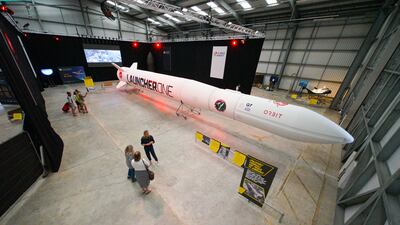The UK will put the “rocket boosters” under innovative space businesses, while pledging to use the sector to bolster its defence capabilities.
In announcing its National Space Strategy, the government said it wants the UK to become one of the leading space economies in the long term and will use the industry's innovations to tackle global challenges such as climate change.
Prime Minister Boris Johnson, who revealed that the Moon landing in 1969 made him want to be an astronaut when he was 5, said, “we have for too long failed to properly embrace the opportunities that the space industry offers”.
Mr Johnson said that the plan would lead to “Global Britain becoming Galactic Britain as we work with other nations to pursue exciting missions and with the UN to set the standards that will ensure space is used responsibly and safely”.
While the UK will not send its first satellite into space until next year, the government said it plans to be the leading provider of commercial small satellite launches in Europe by 2030.
An additional £1.4 billion ($1.92bn) will be invested to strengthen space-related defence capability on top of the £5bn set aside to support the military’s satellite communications.
Defence Secretary Ben Wallace said “the ability to operate in space is fundamental to the success of the military”.
“Collaboration with academic and industry partners ensures we progress with the research and development needed to stay at the forefront of pioneering technology and ahead of our adversaries,” he said.

More details of how much money the government will invest in the strategy are expected at its spending review next month.
But among some of the projects the government is planning are monitoring the sun for space weather events and working on the Nasa-led Artemis programme to return humans to the Moon.
Science and Innovation Minister George Freeman said, “we have bold ambitions for the UK to be at the vanguard of this industry in our role as a science superpower – whether it’s launching the first satellite from British soil, or leading major international space missions to help combat climate change”.
He said the strategy would “put rocket boosters under the UK’s most innovative space businesses, ensuring they can unlock private capital and benefit our home-grown space expertise.
“Above all, by integrating our commercial and military space activities, we will use space to protect British interests abroad and on home soil, establishing the UK as one of the most attractive and innovative space economies in the world.”
Britain has created spaceports in rural Scotland, Wales and Cornwall. The government says the industry is worth more than £16bn annually to the UK and employs 45,000 people. Globally, the space economy was worth roughly £270bn in 2019 but is predicted to rise £490bn by 2030.
“We will demonstrate leadership internationally, ensuring that space remains safe and sustainable as we enter the next exciting phase of exploration and we will take steps to ensure that we can protect and defend the UK,” said Mr Wallace in a joint statement with Business Secretary Kwasi Kwarteng.
“The prime minister has called for the UK to become a meaningful actor in space and for the first time this strategy brings together our civil and defence activities into one integrated approach to achieve this ambition.”


